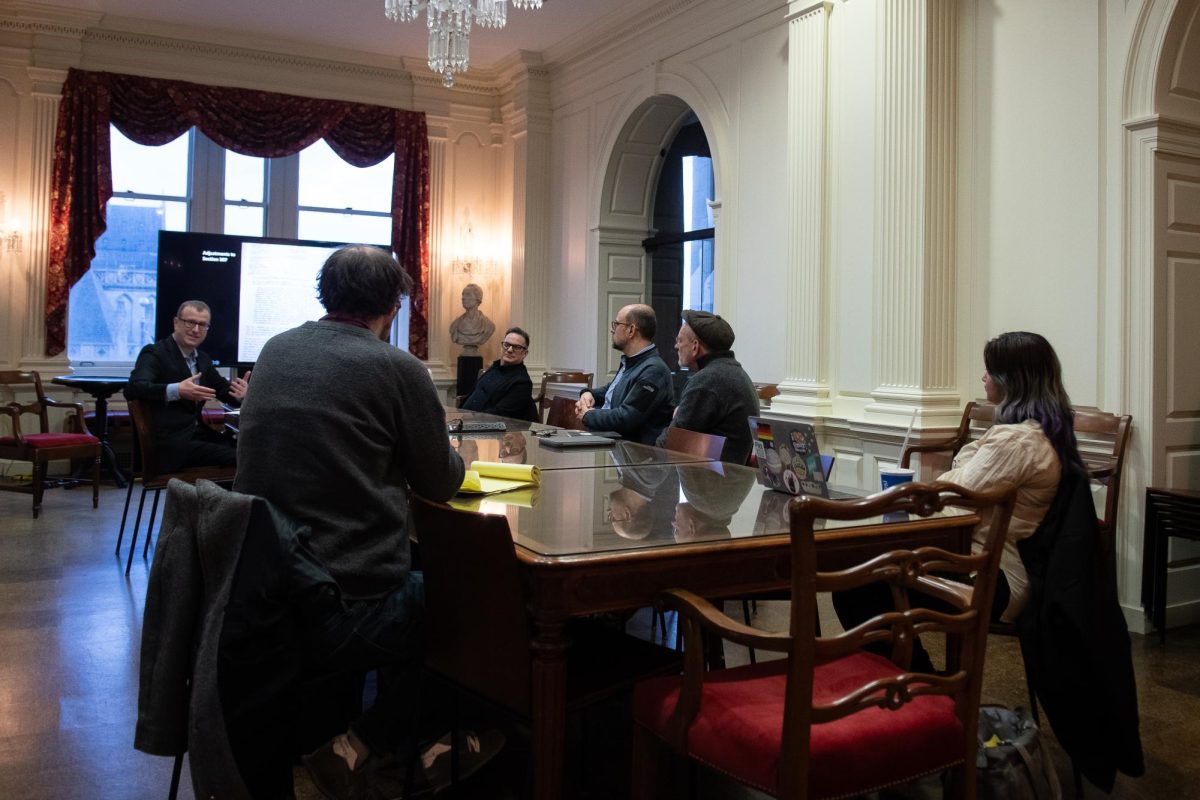Educational Radio broadcasting in the United States has informed millions since the start of radio and produced some of America’s favorite content like “Sesame Street” and “Daniel Tiger’s Neighborhood.” But according to the work of Josh Shepperd, associate professor and undergraduate chair of media studies at the University of Colorado Boulder, educational broadcasting in the United States had a rocky start.
Shepperd explored the history and formation of this field in communications at a colloquium called “The Regulatory Conjuncture of Critical Theory, Mass Comm, and Early Media Reform, 1934-1940,” held by the Film & Media Studies department at the Cathedral of Learning on Thursday, Feb. 27.
The colloquium introduced and explored early educational radio history as featured in his new book, “Shadow of the New Deal: The Victory of Public Broadcasting,” which received the 2024 BEA Book Award alongside others. Shepperd is also a Sound Fellow at the Library of Congress, where he works to preserve America’s radio history.
A mix of undergraduate students and communication and media studies professors attended the colloquium, which followed a lecture and discussion format. Participants asked questions about the lecture and related topics, such as the Payne Fund Studies.
Shepperd began the lecture with his question about criticism of media and subsequent media usage, a curiosity sparked from his work on his most recent book.
“We’re all so critical of media, and then we just play right along with it. Why don’t we look at alternatives? That was kind of the question — what are the alternatives and what are the benefits and attractions of them?” Shepperd said.
This driving question was then put on the back burner as he dove into the history of educational broadcasting, starting with Edward R. Murrow.
According to Shepperd, Murrow was sent by The Rockefeller Foundation to the BBC in 1936 to study enunciation practices. There, he met Charles Siepmann, a BBC employee who was assigned to evaluate public broadcasting in the United States in comparison to the BBC’s system. American public radio at the time was primarily university-led and disorganized. When Siepmann went to the United States, he found public radio to be a major disappointment and stunted in development compared to the BBC. Shepperd quoted Siepmann during the colloquium on his observations of Iowa State University’s Ames radio station.
“‘A pathetically limited staff, of rough cut, pitiable poor down to heal people,’ led by a ‘rather heavy uncongenial type with a rather sub normal Culture Foundation,’” Shepperd said, quoting Siepmann.
University stations did not have enough programming to fill their air time and weren’t providing content matching the standards of the BBC. But, a radio operator at the University of Iowa in Iowa City, Carl Menzer, came up with an idea about sharing content between stations and creating a public radio network.
“What if University stations were to form a decentralized network that could ‘tie up stations from like Wisconsin and South Dakota?’ Such an educational chain might stretch over the entire US and, like the BBC, exchange best programs produced at university,” Shepperd said, quoting Menzer.
This network was created by the National Association of Educational Broadcasters, though it took about 15 years to create something close to Menzer’s original vision, according to Shepperd. The work done by the NAEB laid the groundwork for America’s current public broadcasting giants — NPR and PBS. Shepperd noted how the organization began as “disorganized, underfunded and under supported,” but worked over a decade and a half to create an alternative system from commercialized radio dedication to education.
The Communications Act of 1934, the FCC and the FREC were major focuses of the talk. The Communications Act of 1934 wrote the FCC’s creation into law, although Shepperd has explored research that confounds that finding, and the act established radio content as a “public interest, convenience and necessity.” The FCC created the FREC in 1934, and it banded together organizations from NBC to religious groups, all in the name of working on America’s educational broadcasting. Shepperd thinks this type of union towards the betterment of a certain field could happen again in the United States, especially over AI.
“So I think that we’re going to hit this moment in which we don’t know how to proceed, and all the different expertise are going to have to be gathered to address the AI moment by which jobs are being eliminated … We’re gonna have to figure out — how do you re-recognize humans, and how do you reinvigorate careers?” said Shepperd.
Shepperd went on to discuss the FREC, important scholars in the field like Theodor Adorno and more in the remaining lecture portion of the colloquium. Angel Joseph, who finished their BA last semester in the film and media studies department, attended the colloquium after hearing about it from the department’s email list and enjoyed learning about this part of radio history.
“It was so interesting hearing it, ‘Oh, how much impact this thing had.’ And I also appreciated the little history lessons on what a lot of these scholars were doing beforehand, because I was like, ‘Where does the scholar come in? I have no idea. I have never heard this name before, but I’m learning now,’’ Joseph said.


